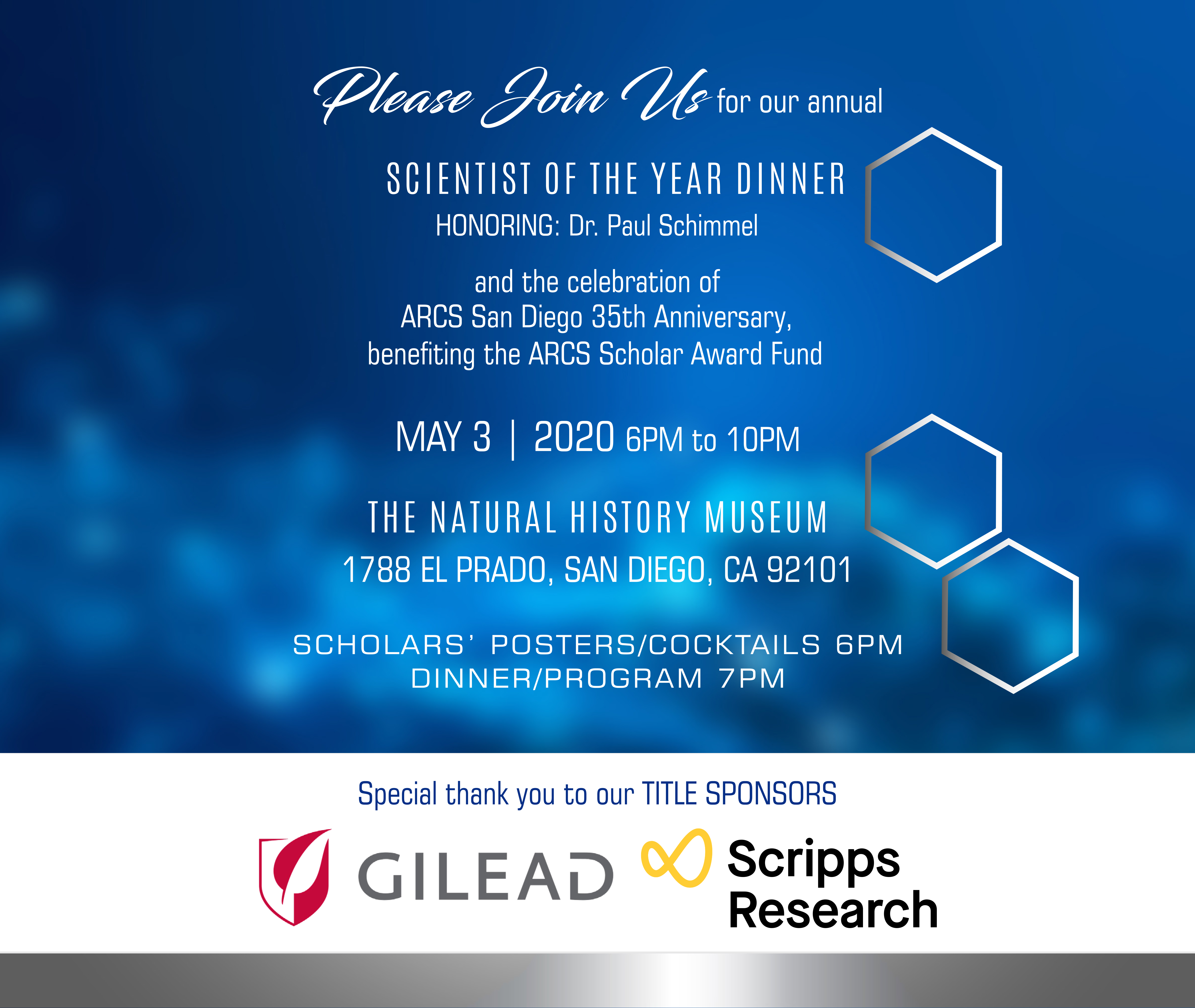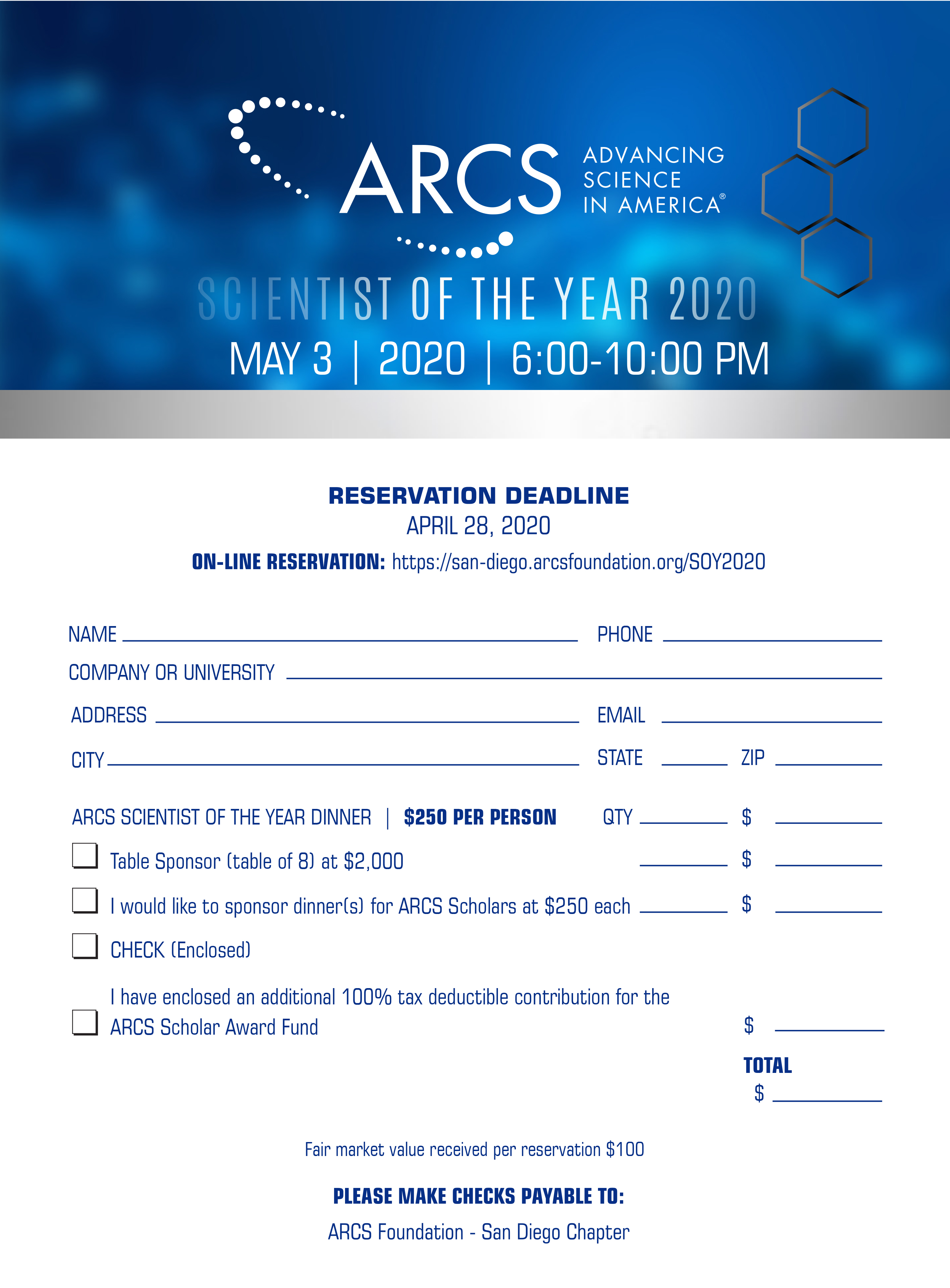ARCS 2020 Scientist of the Year

If you would like to learn more about Sponsorship or Underwriting this event, please Click Here.
This year, we will be honoring Dr. Paul Shimmel of Scripps Research as our 2020 Scientist of the Year. His breakthroughs in tRNA synthetases have been a key ingredient in launching the human genome project and addressing serious pathologies and disease.
Our featured speaker will be Dr. Jeff T. Roberts, Professor of chemistry and Dean, College of Sciences, San Diego State University and ARCS Scholar Alumni.
This event will also provide an opportunity to meet with our 2019-2020 Scholars from Scripps Research, San Diego State University (SDSU), UC San Diego and University of San Diego (USD) who will be presenting posters showcasing their state-of-the-art research.

Scholars Please Register HERE
Purchasing dinner registrations by CREDIT CARD will incur a processing fee. if you would prefer to avoid the transaction fee, you may register and pay by check. Please download and print the Registration and Meal Selection card on this page and follow the instructions.
The deadline for receiving registration payments is April 28th!
if you have any questions, please contact Kayda Johnson at 760-845-2286, email: kaydajohnson@roadrunner.com
Scientist of the Year Honoree: Dr. Paul Schimmel
BIO: DR. PAUL SCHIMMEL is Ernest and Jean Hahn Professor of Molecular Medicine and of Chemistry at Scripps Research. Prior to joining Scripps Research, he was John D. and Catherine T. MacArthur Professor of Biochemistry and Biophysics at MIT (Massachusetts Institute of Technology). Author or coauthor of 500 scientific research publications, he is also coauthor of a widely used 3-volume textbook on biophysical chemistry. His research interests have focused on aminoacyl tRNA synthetases as fundamental interpreters of the genetic information. Through career-long investigations of this ancient and universal set of essential enzymes, his laboratory has worked on a universal mechanism for correcting errors in the interpretation of genetic information, and went on to show how this mechanism is essential for maintaining cellular homeostasis and for preventing serious pathologies and disease. His laboratory also discovered what others have referred to as a primordial, or ‘second’, genetic code that eventually was incorporated into the modern code. In a separate line of research published back in 1983, Schimmel developed the concept of what are now known as ESTs (expressed sequence tags) and the strategy of shotgun sequencing, approaches that several years later were adopted for the human genome project. Nature magazine listed Schimmel’s work on the development of ESTs as one of the four key developments that launched the human genome project (Nature volume 409, p. 862 (2001)). Lastly, his laboratory established connections of synthetases to disease and, most recently, they reported the structural and functional metamorphosis of these proteins, whereby they are repurposed with novel activities, both inside and outside the cell, in a variety of cell signaling pathways. This knowledge is now being applied in clinical trials to treat a major lung disorder.
Honors: Dr. Schimmel is an elected member of the National Academy of Sciences, the National Academy of Medicine, the National Academy of Inventors, the American Philosophical Society, the American Academy of Arts and Sciences, and the American Association for the Advancement of Science. He has been active in many scientific and academic organizations and committees, including past service as President of the Division of Biological Chemistry of the American Chemical Society (presently with over 7,000 members) and as an editorial board member of numerous scientific journals. Contributions to Translational Medicine: Schimmel holds a portfolio of patents and is a cofounder or founding director of what matured into seven NASDAQ-listed enterprises that developed new medicines that flowed out of academic research. These enterprises created FDA-approved medicines. Lives saved by just one of these medicines are estimated at over 250,000.
ABOUT ARCS©
ARCS® Foundation is a nationally recognized nonprofit 501(c)(3) organization started and run entirely by women volunteers who boost American leadership and aid advancement in science and technology. To address the country’s need for new scientists and engineers, ARCS provides unrestricted, merit-based funding to help the country’s brightest graduate and undergraduate students create new knowledge and innovative technologies. The San Diego chapter of ARCS began in 1985 and has grown from the original four founders to 115 member/volunteers today. As we reach our 35th anniversary in 2020, we have made more than 1,400 awards totaling well over $10 million. Our academic partners are: San Diego State University, Scripps Research, University of California San Diego, and University of San Diego. ARCS Scholars are selected by their institutions in recognition of their achievements and their exceptional promise to contribute significantly to their fields. Scholars must be U.S. citizens and have at least a 3.5 GPA; they must be enrolled in academic degree programs in science, engineering, and medical research. The San Diego chapter focuses on supporting students in doctoral programs, and the ARCS Scholars we have funded have a 98% graduation rate. For the 2019-2020 academic year, the San Diego ARCS chapter has awarded $405,000 to 57 Scholars.


